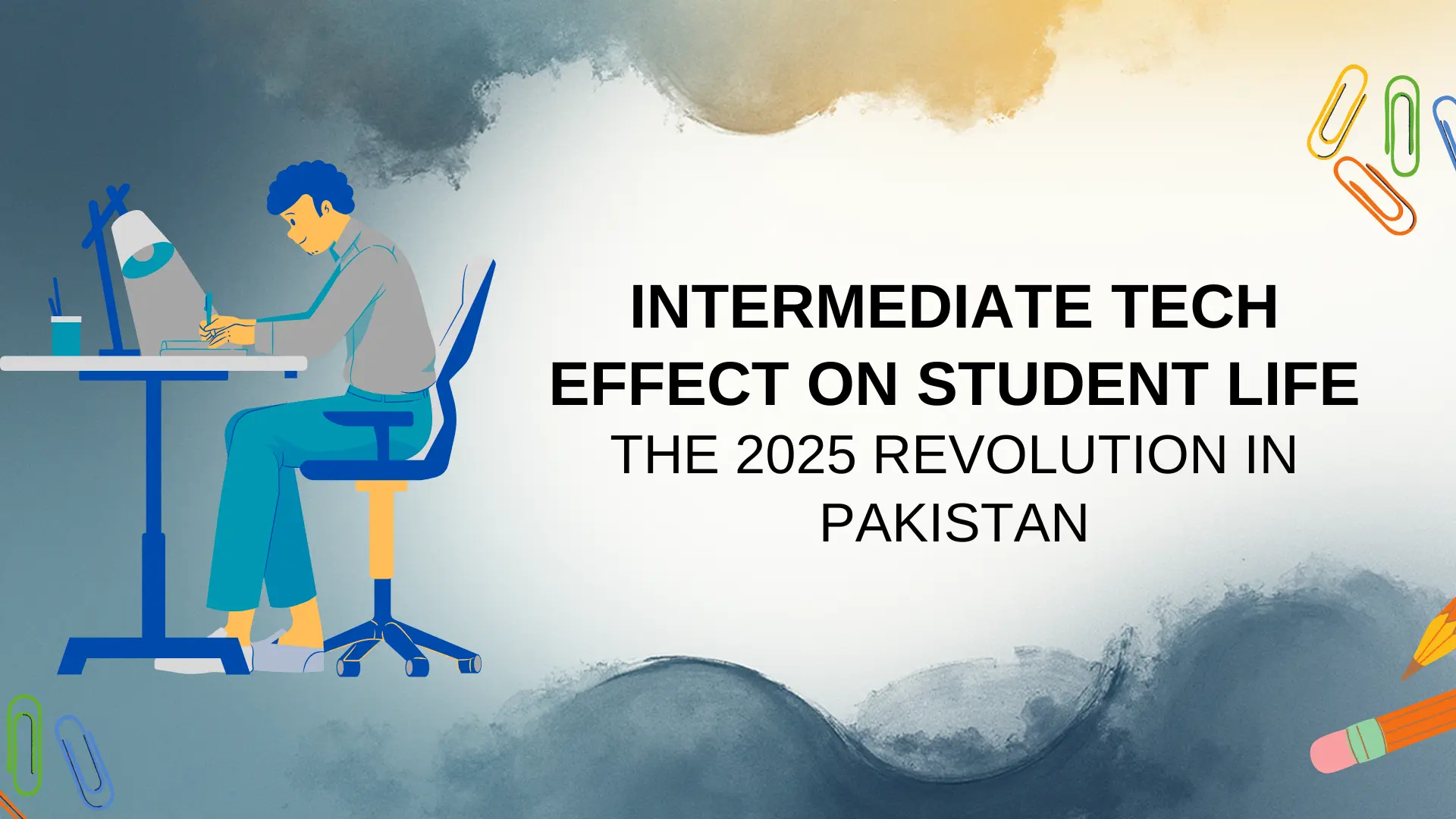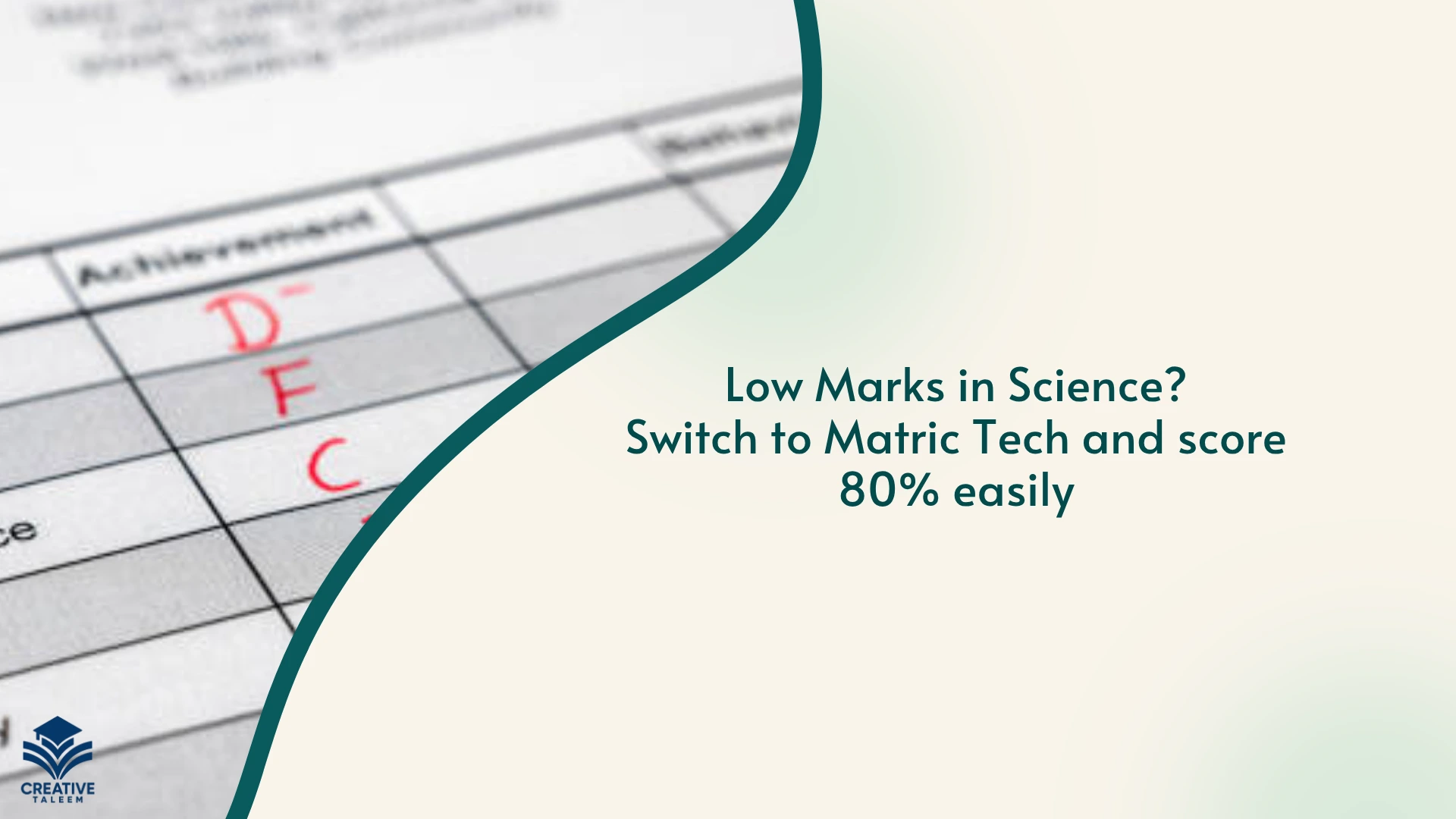For decades in Pakistan, students had only two choices at intermediate level: Science or Arts. That's it. No other options. No flexibility. No consideration for what you actually wanted to study or what skills you naturally had. Everyone was forced into the same two boxes, whether those boxes fit them or not. But in 2025, everything changed. Intermediate Tech launched, and it's completely transforming student life in Pakistan in ways nobody expected.
The Old System That Failed Millions of Students
Before 2025, if you were a Pakistani student finishing matric, your conversation with teachers, parents, and career counselors went something like this: "So, are you doing Science or Arts?" That's literally all they asked. Nobody questioned whether these were the only paths. Nobody considered that maybe, just maybe, students had different interests and talents that didn't fit into these rigid categories.
Students were never given the chance to study what they were actually good at. Instead, everyone studied the same subjects whether they understood them or not. A student who was naturally talented at design was forced to memorize Physics formulas. A student who could have been an amazing healthcare technician was struggling with Literature essays. The system didn't care about individual strengths. It only had two tracks, and you had to pick one.
Meanwhile, modern countries had moved far beyond just Science and Arts. They were offering specialized technical courses, vocational training, and practical skill-based education at the intermediate level. But Pakistan? We stayed stuck with the same old system year after year, decade after decade. Until 2025.
What Actually Changed in 2025
In 2025, Pakistan's education system finally caught up with reality. The government launched Intermediate Tech, and suddenly students had access to courses that were previously only available at university level or through expensive private training centers. Now, these same professional fields are being taught at intermediate level, giving students a two-year head start on their careers.
These aren't theoretical subjects where you memorize definitions and forget them after exams. These are practical, skill-based courses that teach you actual employable skills. Subjects that students were learning from YouTube tutorials or paying thousands for academy courses are now part of the official intermediate curriculum. This is revolutionary.
Fashion Design, which is a massive industry globally and in Pakistan, was never an option at intermediate level before. Students interested in fashion had to suffer through Pre-Medical or Pre-Engineering, then switch tracks later, wasting precious years. Now, they can study Fashion Design right from intermediate level, learning the skills they actually need for their chosen career.
The Real Winners: Students Who Failed or Got Low Grades
Here's something most people won't tell you clearly: getting low grades in the old system wasn't necessarily your fault. It was often the education system's fault. The system expected one teacher to effectively teach all subjects. It expected every student to excel in the same subjects regardless of their natural abilities. That's not education. That's forcing square pegs into round holes.
If you failed Inter Part 1 or got low grades, listen carefully: you're not stupid. You're not a failure. You were just stuck in a system that didn't recognize your actual talents. Not every student is made for traditional science subjects, just like not every student is made for traditional arts subjects. Different people have different skills, and that's completely normal and okay.
Intermediate Tech gives students who struggled in traditional tracks a genuine second chance. A student who barely passed Chemistry might excel in Medical Laboratory Technology. A student who failed Physics might be brilliant at Operation Theatre Technology. The subjects weren't wrong for everyone; they were wrong for YOU. Now you have options that actually match your abilities.
Breaking the "Scope" Myth That Ruined Dreams
In Pakistan, we have this terrible habit of saying certain fields have "no scope." Medical, Engineering, and Software Engineering are considered safe. Everything else? "Beta, isme scope nahi hai." This mindset has destroyed countless dreams and talents. But here's the truth nobody wants to admit: scope doesn't exist in any field by default. YOU create scope.
Let me give you a perfect example. Shehzar, who runs the YouTube channel "Shehzar's Sketchbook," is a famous cartoon artist in Pakistan. He also did FSC Pre-Engineering, just like thousands of other students. But he didn't let that define his entire life. He tried the traditional path, realized it wasn't giving him what he wanted, and carved out his own space in cartoon animation. Today, he's successful doing exactly what he loves.
The point is simple: if someone tells you that becoming a cartoon artist has no scope, or fashion design has no scope, or any creative or technical field has no scope, they're wrong. What they really mean is they don't understand that field or they're too scared to try something different. Real success comes from doing what you're genuinely good at and passionate about, not from following what everyone else says is "safe."
Medical Technology: A Complete Game-Changer
Before 2025, if you wanted to enter the medical field, your options were extremely limited. After Pre-Medical, you had maybe three main paths: MBBS/BDS, Pharmacy, or some clinical roles. That's it. The competition for MBBS was insane, and if you didn't get selected, you felt like your medical dreams were over. Plus, all of this required having excellent FSC Pre-Medical grades. If your grades weren't great, everyone told you the same thing: "Change your field."
But 2025 brought a massive twist. Medical Technology introduced completely new categories at intermediate level. Now students can specialize in Medical Laboratory Technology, Medical Imaging Technology, Operation Theatre Technology, Ophthalmic Technology, Physiotherapy Technology, and Dental Hygiene, among many others. These are real, respected medical careers that previously required you to first complete FSC Pre-Medical and then pursue additional specialized training.
The beauty of these Intermediate Tech medical programs is that you're learning practical, hands-on skills from day one. You're not just memorizing theory from textbooks. You're actually training for a specific medical role. By the time you complete your intermediate in Medical Laboratory Technology, for example, you already have employable skills. You can start working, or you can continue to higher education in that specialized field. Either way, you're not stuck.
The Fields That Were Always There, But Never Accessible
Many of the Intermediate Tech fields aren't actually new professions. They existed before. But they were only accessible after intermediate, which meant students had to first waste two years studying subjects they didn't care about, then switch to what they actually wanted. That's two years of their life they can never get back. Two years of struggling with Physics or Chemistry when they could have been mastering Music or Nursing or Art.
Fields like Musician, Artist, and Nursing existed at higher education levels, but not at intermediate. Now, with Intermediate Tech, these fields are available right from the start. A musically talented student can pursue Music Technology at intermediate level. An artistically gifted student can take formal Art and Design courses. A compassionate person who wants to help others can study Nursing right away.
This is massive because it means students aren't losing precious time anymore. They're starting their specialized education two years earlier than previous generations could. By the time they reach university age, they already have solid foundational skills in their chosen field. They're ahead of where previous students were at the same age.
How This Changes Student Life Completely
The effect of Intermediate Tech on student life goes far beyond just having more subject choices. It's changing the entire psychology of being a student in Pakistan. For the first time, students feel like they have control over their education. They're not just passive recipients being pushed into predetermined tracks. They're active participants choosing paths that make sense for their individual futures.
Students who choose Intermediate Tech fields are noticeably happier and more motivated. Why? Because they're finally studying subjects they actually understand and enjoy. When you're studying something that matches your natural abilities and interests, learning doesn't feel like torture. It feels engaging. You want to learn more. You practice willingly. Your grades improve naturally because you're genuinely interested in the material.
Parents are also changing their mindsets slowly. Initially, many parents were skeptical about Intermediate Tech. They worried about their children's futures, thinking traditional Science and Arts were "safer." But now, as they see students in Intermediate Tech programs thriving, scoring good grades, developing real skills, and having clear career paths, more parents are becoming supportive. The success stories are impossible to ignore.
The Future Reality: Choose Carefully, Choose Wisely
Now that you have these options, choosing your intermediate field has become more important than ever. This isn't a decision to make casually or based on what your friends are choosing. This is about YOUR future, YOUR career, YOUR life. Take it seriously.
Before selecting your intermediate field, look carefully at all available options. Don't just pick something because it sounds interesting. Research what each field actually involves. Talk to people working in those fields. Understand the career prospects. Think honestly about whether your skills and interests match that field. This is your chance to get it right from the start instead of realizing years later that you're in the wrong field.
I genuinely believe that if students choose their Intermediate Tech fields carefully based on their actual interests and abilities, we'll see far fewer students later saying "I wish I hadn't chosen this field." The regret that previous generations felt about wasting years in the wrong educational track can be avoided completely. But only if you make smart, informed choices now.
Final Thoughts: This Is Your Moment
If you're a student right now in 2025, you're incredibly fortunate. You have opportunities that students just a few years ago could only dream about. You're not trapped between Science and Arts anymore. You can pursue Fashion Design, Medical Laboratory Technology, Music, Art, Nursing, and dozens of other fields that match who you actually are and what you're actually good at.
Don't waste this opportunity by making careless decisions. Don't pick a field just because your friend picked it. Don't choose something because your parents pressured you without understanding what you actually want. This is YOUR education, YOUR skill development, YOUR future career. Make choices that serve YOUR life, not someone else's expectations.
Intermediate Tech is changing student life in Pakistan for the better. It's giving students freedom, choice, and the ability to pursue education that actually makes sense for their individual talents and goals. This is a revolution in Pakistani education, and you're living through it. Make the most of it.
For more guidance on choosing the right educational path, understanding new educational options, and making smart career decisions, visit Creative Taleem. We're here to help Pakistani students navigate these exciting new opportunities with honest, practical advice.



